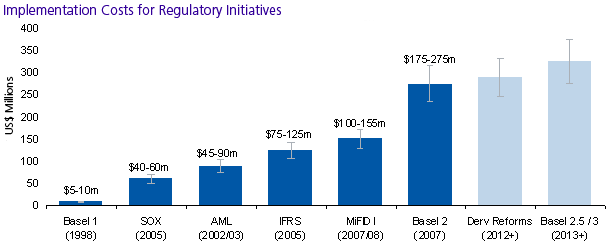Getting Smart About Regulation
Embracing Good Practice Planning and Execution Approaches
Abstract
Celent urges firms to formulate coordinated regulatory response strategies that create value-enhancing outcomes. Over recent years, stakes in the regulatory arena have intensified. While legislative breaches could still inflict substantive fines or reputational damage, the current generation of industrywide regulations like Dodd-Frank, EMIR, Basel, and IFRS not only impose a drag on operating costs, but also have the potential to directly hit at the heart of a firm in relation to its competitive dynamics and impact its revenue flow. For global institutions, significant regulatory reforms and large-scale changes in the past have cost from $10 million to more than $300 million per institution, with the breadth and scale of regulatory scope ever-increasing in the last decade.
In this report, Getting Smart About Regulation: Embracing Good Practice Planning and Execution Approaches, Celent examines the core competencies for success, including firms being dynamically efficient and flexible, controlling implementation and ongoing costs of risk, finance and regulatory activities, and most importantly, exercising leverage from regulatory investments to build out enhanced business capabilities.
Conventional wisdom views regulation as “unproductive sunk costs” that are a drag on the business. At the same time, precedents from the last decade around implementation costs do not paint a rosy picture of what is on the horizon with the present generation of regulatory initiatives.

“As firms chart strategies to navigate the deluge of regulations that have appeared on the radar, they can choose to accept and follow conventional wisdom, or to tackle the tough questions head on by formulating coordinated regulatory response strategies that create value-enhancing outcomes,” says Cubillas Ding, Research Director at Celent and author of the report.
The report analyzes the cycle associated with regulation, risk, and compliance that distinguish winners and losers. Investors, regulators, and customers are already rewarding firms that are building strategic capabilities using regulation as a stepping stone to success. It also analyzes where firms can improve on regulatory planning and IT execution approaches and presents perspectives for how financial services firms can best position themselves to face and tackle the weight of next-generation regulations such as Dodd-Frank, European Market Infrastructure Regulation (EMIR), and Basel III.

